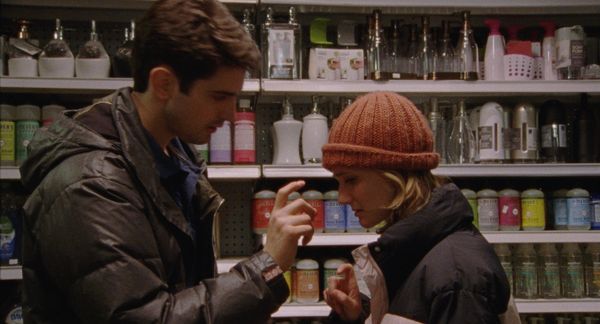 |
| The Scary Of Sixty-First |
In the course of the average year I probably see around 600 or 700 films. There are great ones among them, ones that will in future be recognised as classics, and there are some spectacularly awful ones. Very rarely, however, is there anything quite as distinctive, quite as capable of sticking in the memory as The Scary Of Sixty-First. Directed by newcomer Dasha Nekrosova, who made her name through podcasts, it’s a truly radical piece of work which is likely to be adored by some and considered completely unwatchable by others. It follows two young women who become convinced that the new York flat they’ve moved into was previously used by Jeffrey Epstein, plus the amateur investigator who commences an affair with one of them whilst the other apparently becomes possessed and develops an obsession with Prince Andrew.
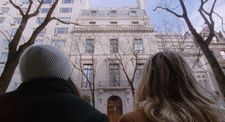 |
| The Scary Of Sixty-First |
Mark Rapaport can be seen in the film as Greg, the boyfriend of the latter. He’s also one of the film’s producers, alongside Adam Mitchell. I first saw the film at Newfest, where it played earlier this year, but a few days ago I got the chance to chat to Mark about it as he prepared for its release in US cinemas and on Digital. I began by asking what it was that first stood out to him about the project.
“It's funny,” he says. “I didn't know about Dasha and her podcasts. I really didn't know her at all. And then I had a friend, well, someone who became my friend recently, who was a producer, and he sent me the script, basically being like, ‘Should I quit my job in LA and make this movie with you?’ Because I told them, you know, that's how it starts. If you want to make a movie, you can't be working at an agency. I read the script and I was like, ‘Yeah, this is the one,’ basically, because of the subject matter and just how provocative it was. It was a horror movie about Jeffrey Epstein. The producer and I knew someone was going to do something about that. And I was like, ‘Well, you know, why not us? Let this be the first Jeffrey Epstein movie.’”
It definitely feels like there’s a cultural moment there which needed to be addressed, but it’s still a big gamble choosing such radical material for a first project. Were they worried about that?
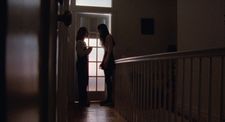 |
| The Scary Of Sixty-First |
“That's a good question,” he agrees. “Because it definitely was more of a gamble than my other successful indie that I had, called Pledge, which was a more safe horror movie. But I think that in the years since that movie that we made in 2016, I was starting to feel like, you know, horror – at least the horror I liked – was trending in the direction of more disturbing and more risk-taking. I was just kind of starting to grow tired of the more traditional stuff like, you know, the slashers, the ghosts, the werewolves.” He laughs. “I did a werewolf movie actually. It was my first movie, it was very straightforward. And it's fun to be able to invent or do something that takes more risks. So it was definitely a conscious risk. But I wanted to take the risk. I wanted to take that gamble. And the fact that it's doing well in the world is a nice reward. In fact, it's done better than any movie I've done so far. I mean, you know, I'm not a millionaire from it. But still, for an indie film, it's doing fairly well.”
There’s the subject matter and then there's also the style of it, which is something that it's going to be very new to a lot of horror viewers, and certainly to viewers of more mainstream fare. Did he always feel that Dasha had the potential to pull that off?
“Yeah,” he nods. “When I met her she had a very strong personality. Seeing her podcast and the personality that she has, I thought she could pull it off. And I also felt that in the worst case, she had her podcast listeners. As the producer I’d be lying if I said that I didn't consider that risk. I hate to say that goes a long way these days, the social media aspect, but it does. And then like you said, the idea of mainstream also obviously keeps changing, right? So, you know, the mainstream audience that the studios try to hit is different than the actual people that are out there trying to find more provocative stuff. So I have to consider that as well. There's so many people on this planet that if we just capture one demographic, we'll be fine.”
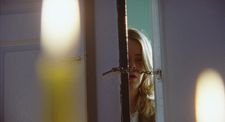 |
| The Scary Of Sixty-First |
How did he get the balance right between supporting her and wanting to stay hands off and let her take her own approach?
“I think that shooting this film was what put me over the edge to say ‘I have to direct,’” he says. “It was definitely difficult to stay hands off. But I think there are two things. One is that I was acting in the film, and I was happy to do it, but as an actor, because I had that relationship with Dasha as well, I let that take the lead, because I didn't want to disturb that performance that I was going for. So I was listening to her all the time, trying not to step on her vision and trying to be the character that she wanted. And then the second thing is because I knew I wanted to direct, and I also wanted to give her that same experience that I would have wanted as a director, which is not being the producer who argues with you or tells you what to do, ‘Because I'm paying for this, so it had better be like this.’ Because I eventually that would be me [as a director], and I would want the same trust that I was going to give her.”
I tell him that I really liked his acting in the film because it's a difficult role in a way. He’s playing the straight guy, the normal guy in that situation, and everybody else is going off in wild directions. How did he approach keeping his character interesting in that situation?
“I really appreciate that,” he says. “I think that, honestly, a lot of it was on the page. They wrote that character in a very funny way.”
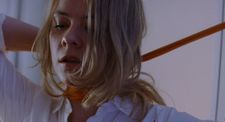 |
| The Scary Of Sixty-First |
He’s the calm centre of the film. So how does he keep that calmness, that normality and yet make Greg engaging?
“I think that for that type of character, like you said, who's more of a calm centre, it's all about listening and reacting, so I sort of had a dual role as a comedic character. One is listening and being the straight man because like you say, a lot of it is really ridiculous. It's like being a late night talk show host. You're paying attention to the crazy stuff and you have to be the one to be reacting to that. But on a second level, I'm also a weird character.
“So I'm playing that dual role as a straight man but yeah, when those lines were written that make me look ridiculous or like, sort of an aloof beta male boyfriend, whatever, I had to also embrace those. And it was fun. I like characters like that, like Larry David on Curb Your Enthusiasm. Maybe it goes back to having three brothers and just needing to react to all the craziness or madness going on around me.”
Was he also very conscious of being the only real male character in such a female centred film?
“Yeah, that was definitely a fun task. I was conscious of that and I tried to to use that whenever possible. Because also, you know, the males in the movie get a pretty bad rap. So on the one hand, I was trying to be the nice guy, but almost every time I tried to be the nice guy, there would be a line in the script that made me look like a total asshole. And again, that's just what Dasha intended. I think sometimes the nice guy is the least trustworthy of all. I think that's what she was going for there.
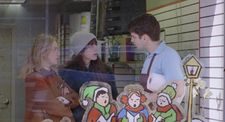 |
| The Scary Of Sixty-First |
“Like I say, I grew up in a family of all boys, but yeah, I tried to be aware of it. Like at the end of the movie, I think I'm still yelling at Dasha and calling her a stupid bitch. I think that was one for the boys.” He laughs, not altogether serious, but he still has a point. “That was me like being like, ‘Okay, wait a second. Maybe my character is the most reasonable one of all these people. I'll just have my little moment here to be like, I'm not going to be pushed around by you girls anymore.’ So that was kind of fun. But yeah, like I said, still not too redeemable a character. Because five minutes before then I was flirting with some redhead at my job.”
So when they wrapped, how did they approach choosing which festivals to submit to?
“We pretty much based our submissions around the best festivals that were accepting at the time,” he says. “We tried to use the Cannes deadline as our benchmark. I don't even know if we actually submitted in time. I think we barely did, but it was a rough cut. And then yeah, I mean, you know, you throw your darts at Sundance, SXSW and then Berlin. And it's funny. Berlin I didn't really think so much about like, in terms of the feasibility of getting in. This is Germany. What do they know about us? We're just some little American film. I always had a lot of respect for Berlin as one of the most prestigious festivals in the world. So I was like, Wow, this would be really cool. And of course, the rejections are coming in. And then Berlin emails and I couldn't really believe it, to be honest. But then, you know, the more I looked into Berlin and learned about the festival, the more that I saw that they do take those risks on smaller films, even American ones. And so I just exceeded our expectations, but I couldn't be happier with the results. Having that international stage then opened up, opened up a lot more opportunities to get into other festivals.
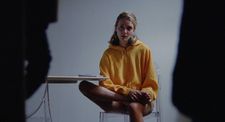 |
| The Scary Of Sixty-First |
“Winning that award at Berlin was also just like, like, ‘What?’ I remember talking about it with the other producer, Adam [Mitchell], and being like, ‘Oh, we're nominated for this award.’ And then we won. it was kind of unreal. And so yeah, I can't say enough good things.”
I remark that, watching it from a UK perspective, it's entertaining to see how the stuff with Prince Andrew goes down. Having been bombarded with pro-royal material on television all my life, it was rather delightful to see that part of it.
“Yeah, I'm really happy to hear that,” he says. “I haven't spoken to a lot of UK people about the film. We're happy to hear that for sure. And we're hoping that the royal family doesn’t try to ban the movie or something, because I'm pretty sure they call the Queen some pretty nasty words there. So that is very funny. And yeah, the Prince Andrew stuff is also just wild. Hopefully, I don't know - maybe this will spark a new investigation.”
So what is he doing next?
“So right after we shot Scary, a few months later, I ended up directing my first short film, called Andronicus, like Titus Andronicus but without the Titus. And that is now online, we just released that. Starring Eric Roberts and Kimball Farley, this actor that I also write with now. And so that was like my first big thing, but actually last month, I then directed my first feature. So I somehow pulled off both during Covid, two non-union projects. And so this new movie is called Hippo.
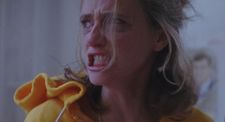 |
| The Scary Of Sixty First |
“I'm really transitioning to directing and writing. I’m not saying I'm never producing again, other than my own stuff, but I'm trying to make this sort of pivot in my career. I have to focus more on directing right now. And this one, Hippo, is like an American comedy tragedy about a very dysfunctional family in 1999, in the middle of Pennsylvania. It's going to be black and white. And I'm just really excited about it. It's definitely different than Scary. I have definitely a different style when I direct my own stuff.”
Is he still going to be doing acting work as well?
“That's a really good question. I have a manager who helps me with my writing and directing. We're talking about that because I'm getting a lot of compliments on my acting. And so I told him, I'm open to it if he can find me a few film roles to apply to. I'd love to keep acting but the audition hustle I don't have time for because I'm writing so much and trying to direct, but I definitely would love to act some more. when the opportunities present themselves.”
The Scary Of Sixty-First opens in US cinemas and on Digital on Christmas Eve.





















